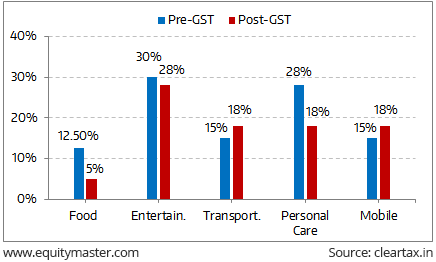- Home
- Todays Market
- Indian Stock Market News July 3, 2017
Sensex & Nifty Open Firm; ITC at Record High Mon, 3 Jul 09:30 am
Asian equity markets are higher today as Chinese and Hong Kong shares show gains. The Shanghai Composite is up 0.19%, while the Hang Seng is up 0.03%. The Nikkei 225 is trading higher by 0.13%. US equities closed mostly higher on Friday as Wall Street capped a strong first-half performance.
Meanwhile, share markets in India have opened the day on a strong note. The BSE Sensex is trading higher by 160 points while the NSE Nifty is trading higher by 45 points. The BSE Mid Cap Index and BSE Small Cap index opened the day up by 0.3% & 0.2% respectively.
Barring automobile stocks, energy stocks and information technology stocks, all sectoral indices have opened the day in the green with FMCG stocks and consumer durables stocks leading the pack of gainers. The rupee is trading at 64.74 to the US$.
ITC share price surged over 6% as the benign tax structure under the Goods and Services Tax regime is expected to boost the stock prices and lift earnings of cigarette-makers. Overall taxation burden on cigarettes has come down by 7-9% under the new regime.
Automobile stocks opened the day on a mixed note with
Maruti Suzuki and Hero MotoCorp, leaders in the country's four-wheeled and two-wheeled vehicle markets, were the first to drop prices after the 1 July midnight adoption of GST.
For the Maruti Suzuki's range of vehicles, prices declined between Rs 2,300 and Rs 23,400 a unit. The range was wider at Toyota's Indian unit, which slashed vehicle prices between Rs 10,500 and Rs 217,000 apiece. Hero MotoCorp's prices declined between Rs 400 and Rs 4,000.
Hyundai Motor India, Tata Motors, and Ford India - manufacturers that compete with Maruti locally - are likely to follow suit with cuts in the next few days, the reports noted.
As For luxury cars, prices of Mercedes-Benz, BMW, Audi, and JLR would decline up to 10% - or Rs 0.10 million for the fanciest of models. On Saturday, Tata Motors-owned Jaguar Land Rover was the first off the block to announce reduced prices in an aggressive advertising run.
Reportedly, post-GST regime, Jaguar Land Rover's locally manufactured prices have come down by 7% on an average.
Going ahead, whether the price decrease post-GST will further boost the customer demands and will it prove to be fruitful for the growth of the Indian automobile industry will be the key thing to watch out for.
Maruti Suzuki share price and Hero Motocorp share price opened the day on a flattish note.
Moving on to the news from the economy. As per the global rating agency Moody's, the Goods and Services Tax (GST) regime will be positive for India's credit profile as it will contribute to productivity gains and higher GDP growth as well as support higher government revenue generation through improved tax compliance.
Moody's positive reaction on GST will come as a shot in the arm of government as there are concerns that the initial teething problem will impact economic growth in the short term.
It is feared that as traders and manufacturer try to come to terms with GST rules, trade and manufacturing in the country may get hit in the short term.
Moody's has a 'Baa3' rating on India with a positive outlook. Meanwhile, industry body Confederation of Indian Industry (CII) said that going forward, GST will contribute to ease of doing business and accelerate new business ventures.
The GST will remove plethora of taxes like excise, service tax and VAT and transform India into a uniform market for seamless movement of goods and services.
In the GST regime, goods and services will be taxed in the either of 5%, 12%, 18% and 28%. We believe GST is a much-needed economic reform. It should eventually expand India's narrow tax base and increase government revenues.
GST's Impact on Aam Aadmi's Spending
While GST will impact businesses and industries in a big way, it won't directly affect the salaried class and self-employed personnel. Since it is an indirect tax, it does not change the way they pay their personal taxes. The only impact they will see would be due to the change in rates of the goods and services they avail.
For information on how to pick stocks that have the potential to deliver big returns, download our special report now!
Read the latest Market Commentary



Equitymaster requests your view! Post a comment on "Sensex & Nifty Open Firm; ITC at Record High". Click here!
Comments are moderated by Equitymaster, in accordance with the Terms of Use, and may not appear
on this article until they have been reviewed and deemed appropriate for posting.
In the meantime, you may want to share this article with your friends!